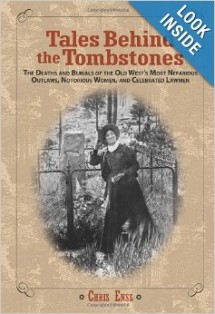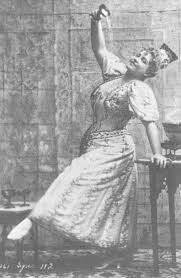Enter now to win a copy of
More Tales Behind the Tombstones:
More Deaths and Burials of the Old West’s Most Nefarious Outlaws,
Notorious Women, and Celebrated Lawmen

“Lillian Russell, (Mrs. Alexander P. Moore) bright star of American comic opera for three decades and internationally known as a professional beauty who died at 2:20 o’clock this morning, had been ill several weeks following a shipboard accident while returning from Europe. Her death was unexpected, as her physicians two days ago announced she had passed the crisis and would recover.”
—The Clinton Herald, June 6, 1922
It was not so much Lillian Russell’s great dramatic ability or her clear, well-trained voice as it was her personality and physical beauty that made her the most famous musical comedy star of her day and acclaimed for more than a generation as “America’s greatest beauty.”
Born on December 4, 1861, in Clinton, Iowa, Helen Louise Leonard had the kind of beauty that stopped traffic from her earliest years. She had a voice that her mother, Cynthia Rowland Leonard, an ardent feminist, paid to have trained when her daughter was still in her teens. Helen Louise was educated at the Convent of the Sacred Heart in Chicago and attended finishing school at Park Institute. She took singing lessons and sang in the church choir at the Episcopal church.
Her parents separated when she was in her teens, and her mother took Helen Louise and moved to New York, where young Helen started training for the grand opera. She could sustain the highest notes with virtually no effort and do it again and again without strain. Her voice coach, Dr. Leopold Damrosch, told her mother that with a few years of training, he could make her a diva to rival the best.
The beautiful blond from Iowa had other ideas. Years of training and rehearsals, with only bit parts and backup roles as an understudy, lay before her on the road to stardom in opera. Helen Louise joined the Park Theatre Company in Brooklyn. She was eighteen when she danced onstage for the first time in the chorus of H. M. S. Pinafore, a Gilbert and Sullivan operetta that went on to resounding success.
Before the run of Pinafore was over, Helen Louise had accepted a proposal of marriage from an admirer in the show. She married the company’s musical director, Harry Graham. That marked the end of her appearance in the chorus. She withdrew from the company and settled into domestic life, but her time as a homemaker didn’t last.
In late 1879, Helen Louise gave birth to a son. A nurse was hired to care for the baby so the actress could once again take up her career. Her paycheck made a big difference for the little family. Her much older husband was not happy with his wife being the bread winner, however; he wanted her to stay home and take care of their child. But a woman raised to be independent is not easily swayed when fame and fortune call.
Then one day Helen Louise returned from the theatre to find her baby desperately ill. Despite all attempts to cure the infant, he died in convulsions. Apparently, the inexperienced nurse had accidentally pierced his abdomen with a diaper pin. Harry accused his wife of neglect, and he divorced her in 1881.
Grieving over the death of her son, feeling betrayed by her husband’s accusation, and devastated over the end of her marriage, Helen Louise concentrated on her career. Tony Pastor, legendary producer of musical comedy, heard her sing at the home of a friend and consequently offered her a job. Helen Louise liked the immediate success she’d already tasted in comic opera. At nineteen, with a statuesque figure, golden curls, skin like “roses and cream,” and a soprano voice that could do everything with ease she had found her first mentor in Tony Pastor.

To learn about More Deaths and Burials of the Old West’s Most Nefarious Outlaws, Notorious Women, and Celebrated Lawmen read
More Tales Behind the Tombstones

